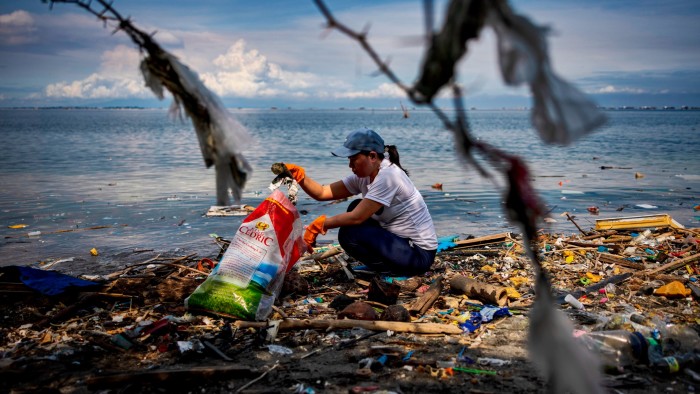Unlock the Editor’s Digest for free
Roula Khalaf, Editor of the FT, selects her favourite stories in this weekly newsletter.
John Kerry served as the 68th US Secretary of State and President Biden’s Special Presidential Envoy for Climate. He drives oceans and climate initiatives at the Carnegie Endowment for International Peace.
Our global ocean, which feeds billions, supports coastal communities and regulates the climate, is in crisis.
Every day, roughly 2,000 garbage trucks’ worth of plastic is dumped into oceans, rivers and lakes. One-third of fish stocks are overexploited, while at least 70 per cent of coral reefs are under threat — with more than 90 per cent at risk of disappearing by 2050. And according to the Marine Conservation Institute, less than 3 per cent of the ocean is highly protected. But where there is urgency there is opportunity: the community of nations has a date with decisive action this week in Nice, France, at the United Nations Ocean Conference (UNOC).
UNOC can be an action-forcing event equal to the moment, driving progress on marine protection, plastic pollution, illegal fishing and blue economies. It can provide critical reassurance to the world that the multilateral architecture built after the second world war is just as relevant today — not invoking nostalgia for the past, but galvanising concrete commitments to prove that when we come together, we can deliver results.
The conference comes at an important moment of shifting geopolitics and in a volatile era for democracies, in which new leadership is needed to fill a considerable vacuum. The US has stepped back from its traditional role by reversing protections, reopening marine national monuments — including the Northeast Canyons and Seamounts Marine National Monument off New England and Pacific Remote Islands protected spaces — to commercial fishing, threatening corals, endangered species and deep-sea ecosystems.
But other nations can seize the mantle of critical leadership. France has the largest exclusive economic zone in the world — referring to a nation’s rights to resources stretching 200 nautical miles off the coast — and is a European leader in marine protected area coverage.
The country could set a strong example by ensuring that destructive practices are banned from French marine protected areas. This includes bottom trawling, where weighted nets are dragged across the seafloor, ravaging marine habitats and releasing vast amounts of stored carbon, accelerating climate change. President Emmanuel Macron has the chance to demonstrate France’s role at the vanguard of marine conservation with policy reforms, specifically a ban on bottom trawling in protected areas.
These actions would give credibility to international leadership and the pledge to protect 30 per cent of land and sea by 2030 (known as the 30 by 30 target) made at the UN biodiversity conference in 2022.
More stories in this report
The Nice conference also provides a stage to push potentially transformative initiatives across the finish line.
First, we stand on the cusp of finalising a landmark global treaty on plastic pollution: legally binding rules to tackle the problem, from production to disposal. It could finally stem the toxic tide that’s not only killing marine life but contaminating our own food chain.
Second, we can end the irrational economics of harmful subsidies that contribute to overfishing and unsustainable fishing. In 2022, the World Trade Organization took a historic step by agreeing to prohibit subsidies that fuel illegal and unregulated fishing. With just 24 more countries needed to ratify this agreement, 2025 could mark the year we stop paying to empty our ocean.
Third, we must protect the high seas — the two-thirds of our oceans that lie beyond any one nation’s jurisdiction. These international waters are rich in biodiversity and play a vital role in Earth’s ecological balance. France and Costa Rica, as co-hosts of the UN conference, can be evangelists of this. A groundbreaking UN High Seas Treaty signed in 2023 will only be realised when 60 countries ratify and it enters into force, enabling the creation of protected areas for biodiversity hotspots and migratory routes.
Fourth, we must accelerate progress on implementing the Green Shipping Challenge, launched at COP27, which called on countries, ports and companies to deliver on actions aligned with limiting warming to 1.5C since pre-industrial times. In April, the International Maritime Organization approved the Net Zero Framework, a regulatory approach to put the industry on track to meet that challenge.
Countries like France need to ensure their industry acts as first movers and not only meets but exceeds the ambition of the framework if we are to rapidly reduce emissions for our ocean.
Only bold, decisive action will build a future where vibrant communities thrive alongside seas that are full of life and allow us to steer away from our current course, which is marked by depleted fisheries, polluted waters and ecological and economic collapse.
Nice could be where we all help turn the tide, and where the US’s oldest ally picks up a mantle we should never have surrendered.
